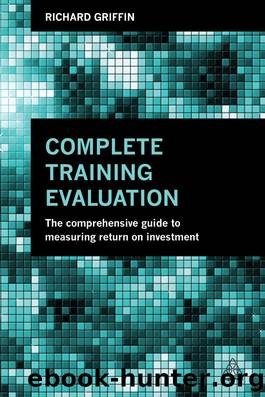Complete Training Evaluation by Richard Griffin

Author:Richard Griffin
Language: eng
Format: epub
Publisher: Kogan Page
In the 1950s my father won ballroom dancing competitions, he was that good at dancing. I, on the other hand (or foot), have two left feet. I believe I am rubbish at dancing. My partner, though, has always wanted to learn to dance so two years ago we signed up for a day-long introductory dance course. It is no exaggeration to say that it was one of the most hideous experiences of my life. By the end of it I could hardly remember how to walk, let alone do the cha-cha or rumba!
This learning non-outcome for me had nothing to do with the dance teacher, who was excellent and managed to get everyone else gliding around the dance floor effortlessly while I stumbled and stepped on toes. I suspect the reason that I was quite so terrible is that I came to the course with a fixed belief that I was going to be poor. I had weak, well, maybe zero, self-efficacy: I did not believe I could dance. This created a barrier to my ability to learn. Setbacks were just that â setbacks, rather than learning challenges to be overcome. They reinforced my feeling that I am not able to dance. In fact all the items in the box below that characterize weak self-efficacy apply to dancing lessons and me!
I did not go back to the dance school â probably to the relief of the rest of the class and teacher! But if I had maybe I would have slowly got better. Small successes can snowball. A couple of successful turns and my self-efficacy would have increased. However, weak self-efficacy meant that I was not committed to the training and so that was that.
I should point out at this stage that a little bit of self-doubt is no bad thing. In fact some research suggests that there may be value in reducing high levels of self-efficacy to make learners work harder (Vancouver and Kendall, 2006). If a learner has very high levels of self-efficacy they may not believe that they have to work too hard to succeed. Luckily for us this is a training design rather than evaluation issue! What we are interested in as evaluators is the degree of self-efficacy learners bring to training, the extent to which the training changes that and what happens when learners return to the workplace.
REFLECTION 11.1: SELF-EFFICACY
Can you think of learning experiences that you have had where you had a strong sense of self-efficacy and others where you had a weak sense? Characteristics of weak self-efficacy might include trying to avoid the learning altogether, a belief that it is not possible for you to master what is being taught and apply it, general feelings of negativity and a loss of confidence.
Download
This site does not store any files on its server. We only index and link to content provided by other sites. Please contact the content providers to delete copyright contents if any and email us, we'll remove relevant links or contents immediately.
Hit Refresh by Satya Nadella(9127)
The Compound Effect by Darren Hardy(8950)
Change Your Questions, Change Your Life by Marilee Adams(7765)
Nudge - Improving Decisions about Health, Wealth, and Happiness by Thaler Sunstein(7696)
The Black Swan by Nassim Nicholas Taleb(7114)
Deep Work by Cal Newport(7072)
Rich Dad Poor Dad by Robert T. Kiyosaki(6613)
Daring Greatly by Brene Brown(6505)
Principles: Life and Work by Ray Dalio(6423)
Playing to Win_ How Strategy Really Works by A.G. Lafley & Roger L. Martin(6258)
Man-made Catastrophes and Risk Information Concealment by Dmitry Chernov & Didier Sornette(6012)
Big Magic: Creative Living Beyond Fear by Elizabeth Gilbert(5758)
Digital Minimalism by Cal Newport;(5751)
The Myth of the Strong Leader by Archie Brown(5502)
The Slight Edge by Jeff Olson(5411)
Discipline Equals Freedom by Jocko Willink(5383)
The Motivation Myth by Jeff Haden(5207)
The Laws of Human Nature by Robert Greene(5184)
Stone's Rules by Roger Stone(5082)
